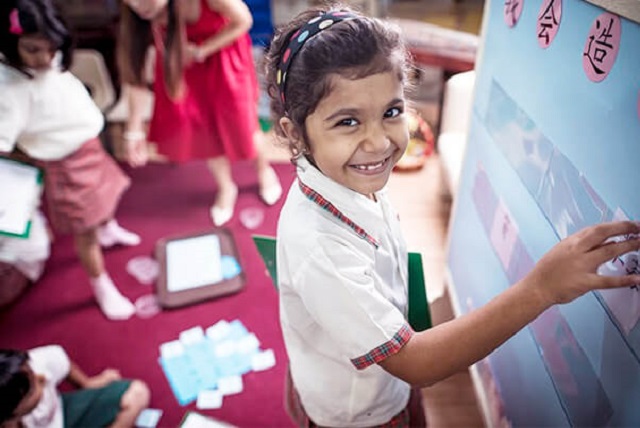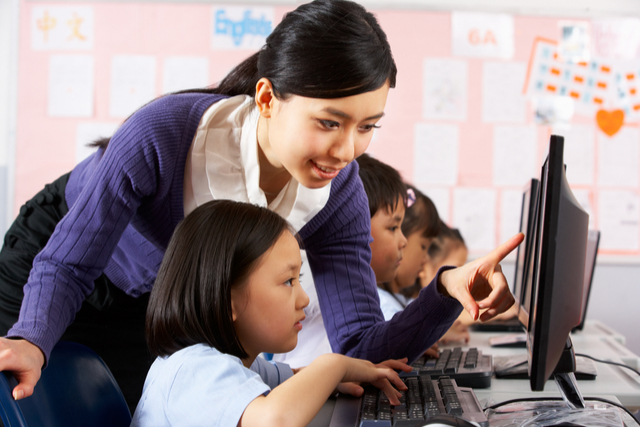Building A Strong Foundation For Lifelong Learning
Early Years education cultivates a joy of learning in children from a young age and has proven to have a positive impact on lifelong education. Inquiry-based learning complements a child’s innate curiosity and helps them develop confidence in their abilities by creating the best possible learning opportunities.
A strong foundation begins with getting the basics right, and children (and adults, for that matter!) learn best when the subject matter is interesting, meaningful and relevant to them.
Language and Literacy: ABC’s
How children learn to read and write is fascinating. They see words and letters as part of their everyday lives: street signs, brand labels, the words on their favourite cereal boxes. From there, your little tot starts to perceive how these letters and symbols work, and slowly understand that they are used to convey meaning, and to communicate with others.
Children at EtonHouse are immersed in language and literary experiences – reading books and being read to every day, making their own signs and lists, writing letters to their friends and recording their thoughts and experiences in a personal journal. Prints and images can be found all over the classroom – tools and toys are labeled with pictorial and letter symbols for association; children are encouraged to pen down their experiences and comments even when making art. These portfolios capture their growth and are readily available for them to read and reflect on their past learning.
Fidelia Yeo’s children attend EtonHouse and when her son Michael was in Nursery 1, he was introduced to the alphabet through a project in which he printed the letters on paper with his classmates. It was literally a hands-on project as the children got to ink up their hands to print each letter. The papers were then turned into a book using a Japanese bookbinding method. The children not only learnt the alphabet, but also had the chance to create something beautiful and unique.
Numeracy: 123
Numeracy, taught with the inquiry-based approach, is more than just being able to recite or count aloud repeatedly. Inquiry-based learning focuses on helping children understand how numbers are a part of their everyday lives. E.g. How many children are here today? How many children came on the bus and how many by car? Do we have enough bowls for all of the children? Who has more? What happens if we take some away?
The focus is on developing the skills, attitudes and dispositions which will aid children in their lives through
- Representing abstract concepts with symbols
- Problem-solving and flexible thinking
- Inquiry and investigation skills
- Application and integration skills
- Reasoning
- Risk-taking
- Self-reflection and self-evaluation
Parental involvement for greater success
Research shows that building an open and collaborative relationship with the child’s parents and family has a significant impact on the child’s learning in preschool. Children settle positively into preschool settings and engage in a more robust manner when they perceive an open, two-way communication between educators and parents.
At EtonHouse, parents are regularly updated on their child’s progress and involved in the learning process. In addition to receiving regular newsletters about their child’s preschool experiences, the children (from Nursery 1 onwards) bring home a reading diary regularly. This individualised diary (one for each language) shares what the children have been reading to their teachers that week, and when the children bring the diary home, they are encouraged to try reading it to their parents. A parent's comment section is included in the diary, giving parents the chance to jot down their experiences and feedback.
Children also have a journal to write down their thoughts about what they have seen and learnt in school. When Fidelia’s daughter, Julia, was learning about famous painters in K2, her class was asked to write what they felt about the different painters, share which painting they liked most and what they hoped to achieve. Not only does this enhance the children’s general knowledge, but it also gives parents greater insight into their children’s development and growth as they learn to express themselves.
When in doubt, ask
Learning through inquiry provides a safe environment for children to voice their thoughts and have their views taken into consideration. For instance, during an inquiry project on ‘Sustainability’, some Nursery 1 children were given the opportunity to grow their own vegetables. Through the process, children were encouraged to work independently, think critically and contribute to a finished product they could take pride in (not forgetting that learning took place throughout the process).
This inquiry project motivated the children to ask questions – What do plants need to grow strong and healthy? Do all vegetables grow underground? Research was conducted via planting and gardening in the preschool. Throughout this project, the children were encouraged to create signs (Language and Literacy), measure and record the growth of the vegetables (Numeracy) and present their findings to their peers (Oracy).
Pauline Ko, a mother of two girls enrolled in EtonHouse, attested to how inquiry-based learning helped her less vocal daughter, Geraldine, grow in confidence, “She was shy initially, but slowly she learnt. As the environment was safe and she grew very comfortable with her teachers, she started to open up and now you can’t stop her from talking!”
Inquiry-based learning is something that can be done anytime, anywhere. Here are some helpful tips for parents as they continue to support their child’s learning journey:
- Observe more, direct less - A lot can be learned about children simply by observing them at play. Does your son like to pretend play that he is a chef? Have him with you in the kitchen as you cook and talk to him about different ingredients and cooking methods. Does your daughter choose to read only dinosaur stories? Bring her to a museum with dinosaur fossils and learn about dinosaurs together. Parents don’t always have to be the ones taking charge, let your child lead you in their journey of discovery!
- Give your full attention - We live in a world full of distractions. Consciously set aside your mobile device when you are with your child. By truly knowing that they have your undivided attention, they can spend more energy learning and exploring, and less on doing things to get your attention.
- Practise patience - Be patient when you are being asked questions, even when they seem unending, and try to view it from your child’s perspective. They are eager to learn about the world and look to you as their guide. It is okay not to know all the answers, you can learn together with your child.
- Respect your child - Children have their own unique way of looking at the world, hence it is important to respect and not ridicule their views and opinions.
It takes a village to raise a child !
Join our WhatsApp Groups or Facebook Group to interact with parents about infant care/child care in Singapore..









